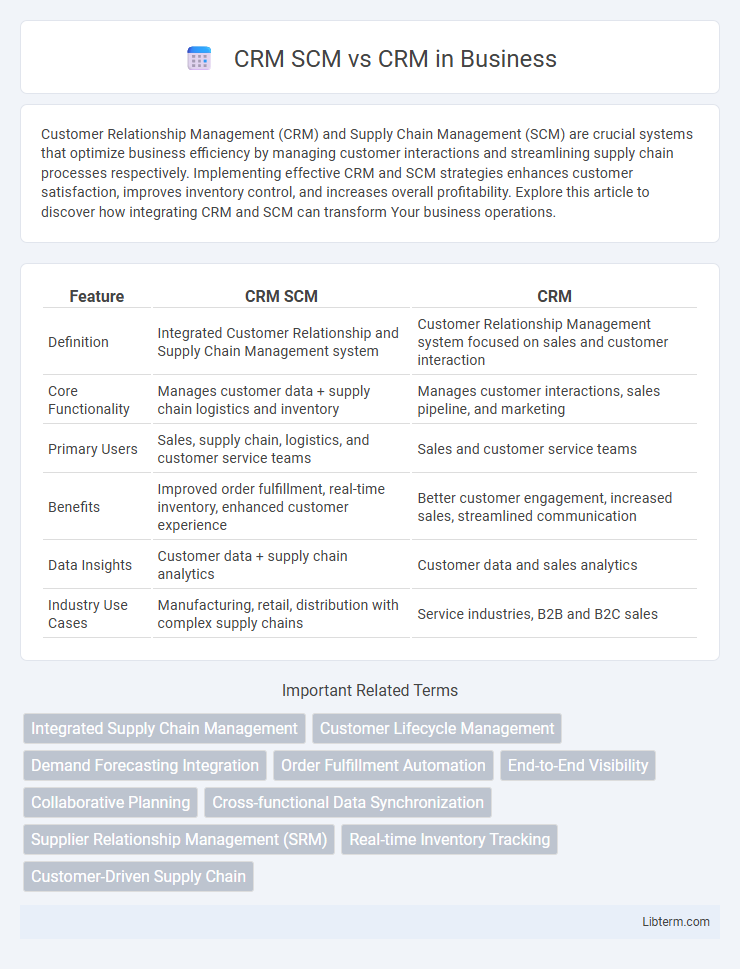Customer Relationship Management (CRM) and Supply Chain Management (SCM) are crucial systems that optimize business efficiency by managing customer interactions and streamlining supply chain processes respectively. Implementing effective CRM and SCM strategies enhances customer satisfaction, improves inventory control, and increases overall profitability. Explore this article to discover how integrating CRM and SCM can transform Your business operations.
Table of Comparison
| Feature | CRM SCM | CRM |
|---|---|---|
| Definition | Integrated Customer Relationship and Supply Chain Management system | Customer Relationship Management system focused on sales and customer interaction |
| Core Functionality | Manages customer data + supply chain logistics and inventory | Manages customer interactions, sales pipeline, and marketing |
| Primary Users | Sales, supply chain, logistics, and customer service teams | Sales and customer service teams |
| Benefits | Improved order fulfillment, real-time inventory, enhanced customer experience | Better customer engagement, increased sales, streamlined communication |
| Data Insights | Customer data + supply chain analytics | Customer data and sales analytics |
| Industry Use Cases | Manufacturing, retail, distribution with complex supply chains | Service industries, B2B and B2C sales |
Introduction to CRM and SCM
Customer Relationship Management (CRM) systems focus on managing interactions and relationships with customers to enhance sales, customer service, and retention. Supply Chain Management (SCM) systems optimize the flow of goods, information, and finances from suppliers to customers to improve operational efficiency and reduce costs. While CRM emphasizes customer satisfaction and market strategies, SCM centers on inventory management, logistics, and production planning.
Defining CRM: Key Concepts
Customer Relationship Management (CRM) centers on managing interactions and relationships with customers to enhance satisfaction, loyalty, and retention. Supply Chain Management (SCM) integrates the flow of goods, information, and finances from supplier to customer to optimize efficiency and reduce costs. While CRM focuses on customer-centric strategies and data analysis, CRM integrated with SCM aligns customer needs with supply chain processes for improved service delivery and operational agility.
Understanding SCM: Core Functions
Supply Chain Management (SCM) focuses on optimizing the flow of goods, information, and finances from raw materials to end consumers, emphasizing procurement, production, distribution, and logistics. Customer Relationship Management (CRM) concentrates on managing interactions with customers to improve retention, sales, and satisfaction through sales automation, customer service, and marketing campaigns. Integrating CRM with SCM enhances visibility across the supply chain and customer demands, enabling more accurate forecasting, inventory management, and personalized service delivery.
CRM SCM Integration: What Does It Mean?
CRM SCM integration refers to the seamless connection between Customer Relationship Management (CRM) and Supply Chain Management (SCM) systems, enabling real-time data exchange and collaboration across sales, customer service, and logistics. This integration enhances demand forecasting accuracy, improves order fulfillment efficiency, and promotes a unified customer experience by aligning supply chain processes with customer needs. Optimizing CRM SCM integration helps businesses reduce operational costs, increase customer satisfaction, and achieve end-to-end visibility across the entire value chain.
CRM vs CRM SCM: Main Differences
CRM vs CRM SCM primarily differs in scope and functionality, where CRM (Customer Relationship Management) focuses on managing customer interactions, sales, and support to enhance customer satisfaction and retention. CRM SCM (Supply Chain Management integrated with CRM) combines customer relationship processes with supply chain operations, enabling seamless coordination from demand forecasting to order fulfillment. This integration improves visibility across sales, inventory, and logistics, driving operational efficiency and better customer service outcomes.
Benefits of Standalone CRM Systems
Standalone CRM systems offer specialized tools for managing customer relationships, sales tracking, and marketing automation without the complexity of supply chain processes. These systems provide faster implementation, user-friendly interfaces, and cost-effective solutions tailored to sales and customer service teams. Businesses benefit from enhanced customer data management, improved communication, and increased productivity by focusing solely on CRM functions.
Advantages of Integrated CRM SCM Solutions
Integrated CRM SCM solutions enhance operational efficiency by synchronizing customer relationship management with supply chain processes, resulting in real-time data sharing and improved demand forecasting. These solutions facilitate seamless communication between sales, inventory, and logistics teams, reducing order fulfillment times and increasing customer satisfaction. The combined system enables better resource allocation and cost savings through streamlined workflows and accelerated response to market changes.
Challenges in Combining CRM and SCM
Integrating Customer Relationship Management (CRM) and Supply Chain Management (SCM) systems poses challenges such as data synchronization issues, inconsistent information flow, and differing system architectures. These obstacles can result in delayed order processing, inaccurate demand forecasting, and inefficient inventory management. Overcoming the disparity between customer-facing interactions and backend supply operations requires robust middleware solutions and unified data platforms.
Choosing Between CRM and CRM SCM
Choosing between CRM and CRM SCM depends on business priorities: CRM (Customer Relationship Management) focuses on managing customer interactions and sales processes to enhance customer satisfaction and retention. CRM SCM (Customer Relationship Management integrated with Supply Chain Management) combines customer data with supply chain operations, optimizing order fulfillment, inventory management, and delivery efficiency. Businesses seeking to align customer engagement with operational logistics benefit more from CRM SCM, while those prioritizing marketing and sales functions may find standalone CRM sufficient.
Future Trends in CRM and SCM Integration
Future trends in CRM and SCM integration emphasize AI-driven predictive analytics to enhance demand forecasting and customer personalization. Real-time data synchronization between CRM and SCM platforms improves supply chain agility and customer satisfaction by enabling rapid response to market changes. Enhanced automation and blockchain technology are set to increase transparency, security, and efficiency in the integrated management of customer relationships and supply chains.
CRM SCM Infographic

 libterm.com
libterm.com